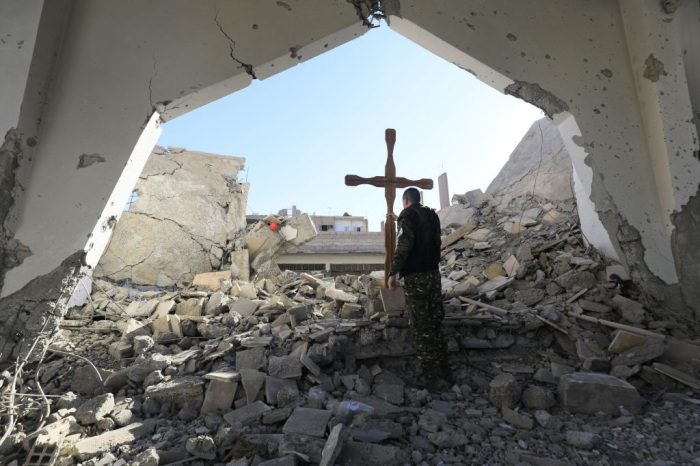2 killed, dozen injured by terrorist attack on Syrian church inauguration

A Greek Orthodox church in Syria built as a replica of Istanbul’s Hagia Sophia with Russia’s help was bombed during its inauguration, according to reports, killing at least two people and injuring about a dozen others.
A rocket was fired by unspecified “terrorist organizations” targeting the crowded inauguration ceremony of Hagia Sophia Church in the town of Al-Suqaylabiyah, about 30 miles northwest of Syria’s central province of Hama on Sunday, AFP reported, citing the Syrian Arab News Agency.
The attack reportedly involved rockets, missiles or armed drones.
The Syrian government of President Bashar al-Assad was building the church as a replica of Hagia Sophia in Istanbul, Turkey, with the help of the Russian government in response to the Turkish government’s converting that building to a mosque in July 2020, Catholic News Agency reported.
The construction of the “mini” replica of Hagia Sophia, a church dedicated to divine wisdom, started two years ago, with the approval of the Damascus government, according to Fides.
The U.S.-based persecution watchdog International Christian Concern said that while the perpetrators of the church attack are unknown, “it is believed to be members affiliated with Turkish-backed non-state actors.”
“Throughout the civil war, we have seen the Syrian government, Turkey, Russia, and others compete for influence across the country,” ICC President Jeff King said. “Sunday’s attack is a painful reminder that this competition repeatedly places innocent Christians in the crossfire of regional violence.”
He said that “[w]arring parties in Syria have once again shown unacceptable disregard for civilian life. Our prayers are with the victims of this attack.”
Parts of Hama province are controlled by Hayat Tahrir Al-Sham, the former franchise in Syria of Al-Qaeda, and other rebel groups also remain active with varying degrees of Turkish backing, according to AFP.
Turkish President Recep Tayyip Erdogan has been seeking to gain support among his conservative base amid economic and political uncertainty.
Istanbul’s Hagia Sophia, built in 537 A.D. as a Greek Orthodox church, was the seat of Eastern Christianity for 900 years before the city was seized in the 15th century by Sultan Mehmed II, the Conqueror, who converted it into an Ottoman mosque. In 1934, modern Turkey’s founder, Mustafa Kemal Ataturk, banned worship in Hagia Sophia and designated it as a museum.
Global persecution watchdog Open Doors USA ranks Syria as the 15th-worst country in the world when it comes to Christian persecution. The Middle Eastern country's Christian population has dwindled since civil war began in 2011. Syria is also home to several Islamic extremist groups.
According to the watchdog, public expression of faith is dangerous for Christians in areas where extremists have territorial control.
"Even though the public threat of ISIS has largely subsided, Christians in Syria still grapple with daily persecution that may become violent. In areas where Islamic extremist groups are active, leaders of historical church communities may be targeted simply because they are more visible," an Open Doors fact sheet states. "But leaders of other Christian groups are also vulnerable because they may be more active in evangelism. Church buildings are completely destroyed in many parts of Syria where Islamic extremists had control (or continue to maintain control)."




























